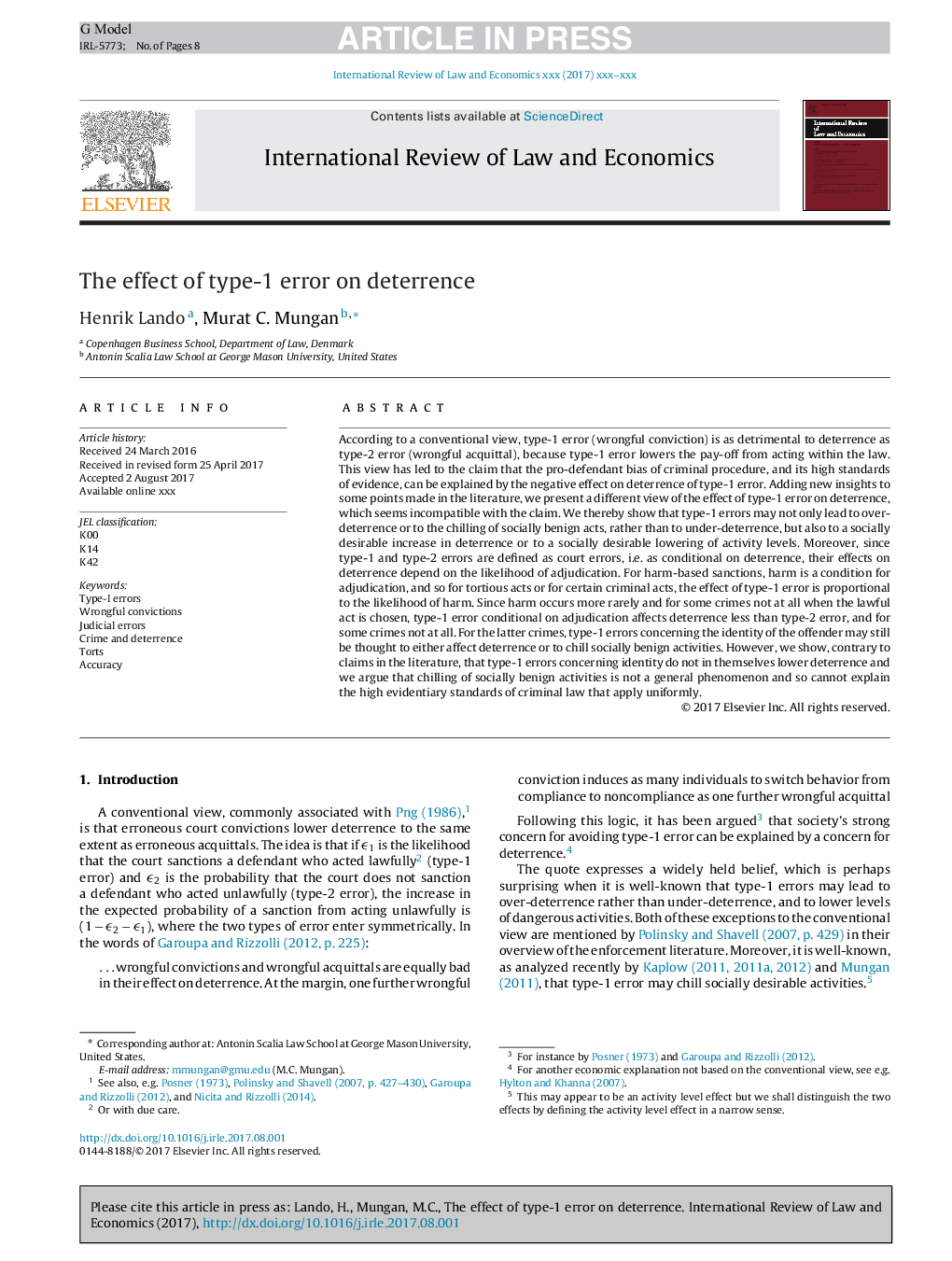ترجمه فارسی عنوان مقاله
اثر خط 1 نوع در بازدارندگی
عنوان انگلیسی
The effect of type-1 error on deterrence
| کد مقاله | سال انتشار | تعداد صفحات مقاله انگلیسی |
|---|---|---|
| 125990 | 2018 | 8 صفحه PDF |
منبع

Publisher : Elsevier - Science Direct (الزویر - ساینس دایرکت)
Journal : International Review of Law and Economics, Volume 53, March 2018, Pages 1-8
ترجمه چکیده
بر طبق نظر متداول، خطای نوع 1 (محکومیت غیرقانونی) به عنوان خطا نوع 2 (مجازات غیرقانونی) به عنوان بازدارنده مضر است، زیرا خطای 1-نوع، باعث کاهش پرداخت از عمل در قانون می شود. این دیدگاه منجر به این ادعا شده است که تعصب طرفدار متهم در مورد پرونده کیفری و استانداردهای بالای آن از طریق تأثیر منفی بر بازدارندگی خطای نوع 1 توضیح داده شده است. با اضافه کردن بینش جدید به بعضی از نکات نوشته شده در ادبیات، ما یک دیدگاه متفاوت از تاثیر خطای نوع 1 در بازدارندگی ارائه می دهیم که به نظر می رسد با ادعای ناسازگار نیست. به این ترتیب ما نشان می دهیم که خطاهای نوع 1 نه تنها منجر به بازدارندگی بیش از حد و یا خنثی کردن اقدامات خوشایند اجتماعی می شوند بلکه به دلیل بازدارندگی کمتر و همچنین افزایش اجتماعی مطلوب در بازدارندگی یا کاهش اجتماعی سطح مطلوب . افزون بر این، از آنجا که خطاهای نوع 1 و نوع 2 به عنوان خطاهای دادگاه تعریف می شوند، به عنوان مثال، به عنوان شرایط بازدارنده، تأثیرات آنها بر بازدارندگی بستگی به احتمال رسیدگی دارد. برای تحریم های مبتنی بر آسیب، آسیب شرایطی برای تصمیم گیری است، و به همین دلیل برای اعمال جرم و یا اعمال جنایی خاص، اثر خط 1 نوع متناسب با احتمال آسیب است. از آنجا که آسیب به ندرت اتفاق می افتد و برای برخی از جرایم، زمانی که عمل قانونی انتخاب می شود، خطا نوع 1 به علت قضاوت بر بازدارندگی کمتر از خط 2 تایید می شود و به هیچ وجه جرمی ندارد. برای جنایات اخیر، خطاهای نوع 1 در ارتباط با هویت مجرم ممکن است همچنان بر روی بازدارندگی تاثیر گذاشته و یا فعالیت های خوش خیم اجتماعی را خنثی کنند. با این حال، ما بر خلاف ادعاهای ادبیات نشان می دهیم که خطاهای نوع 1 در رابطه با هویت در خود بازدارندگی کمتری نیست و ما استدلال می کنیم که سرد شدن فعالیت های سودآور اجتماعی یک پدیده عمومی نیست و بنابراین نمی تواند استانداردهای قانونی بالا در قانون کیفری را توضیح دهد که یکنواخت عمل می کنند

